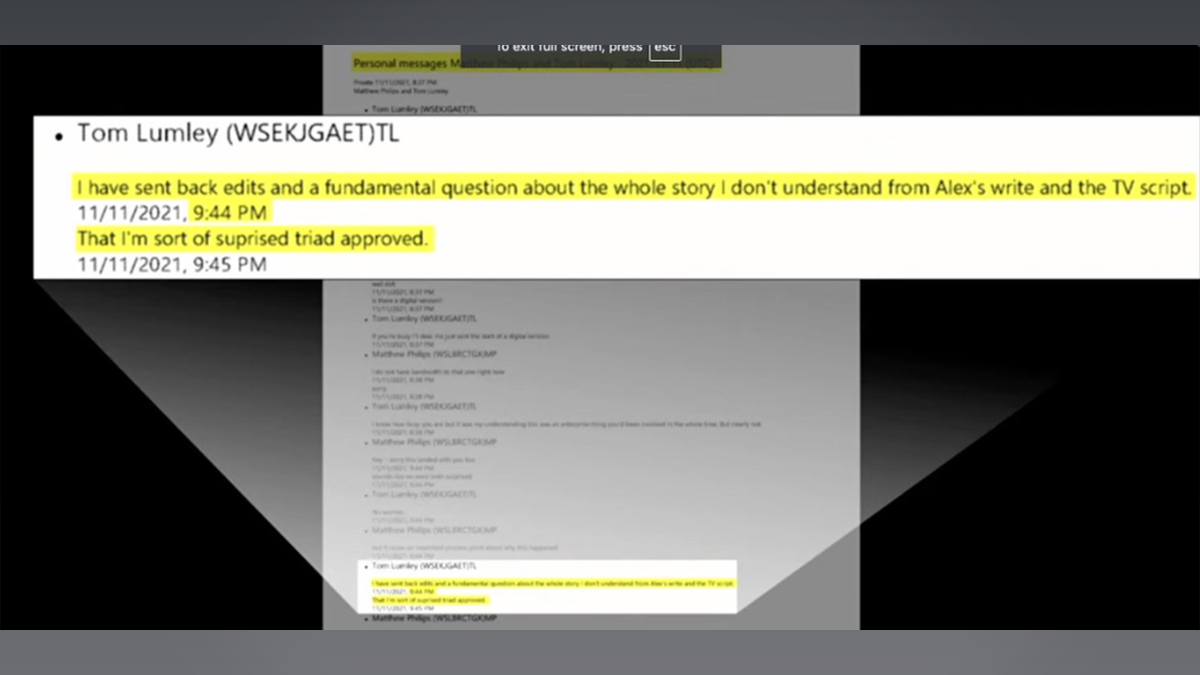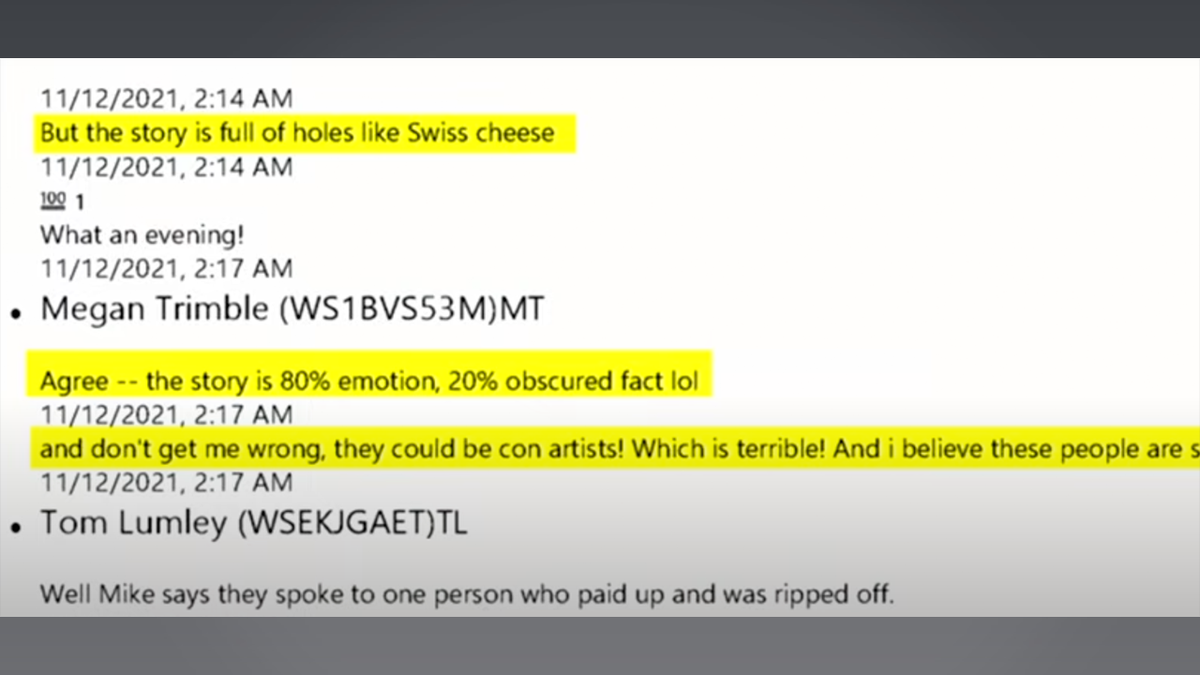CNN defamation case: Editor who said story ‘as full of holes as Swiss cheese’ grilled on witness stand

PANAMA CITY, FLORIDA – CNN’s senior national security editor Thomas Lumley was arrested in court Tuesday after internal emails revealed he had serious doubts about a “flawed” report that was at the center of a defamation lawsuit.
Zachary Young, a US military veteran, alleges that CNN defamed him in a November 2021 report that first aired on “The Lead with Jake Tapper,” suggesting that he illegally benefited from desperate people trying to flee Afghanistan following the withdrawal of the Biden-led military. which means that he has engaged in “black market” dealings and damaged his professional reputation as a result. The report first ran on television and was later turned into an article published on CNN’s website.
Lumley, who has worked for CNN for more than six years, was called as a witness after internal messages showed he felt the report was “full of holes like Swiss cheese.”
CNN EXAMINATION: GENERAL TESTIFIES HE WOULD HAVE HIRED ZACHARY JR BEFORE THE SCENE ON THE AIR, NOT AFTER
CNN’s senior national security editor Thomas Lumley was arrested in court Tuesday after internal emails showed he had serious doubts about a “flawed” report that is at the center of a defamation lawsuit. (Fox News Digital)
Jurors were shown a variety of e-mails and text messages during Lumley’s testimony, including a message in which he suggested that reporter Alex Marquardt should add information that people who paid large sums of money to get out had left Afghanistan.
Lumley received a draft of a printed article written by Marquardt and replied, “One big thing I’m not clear on. Are there people paying these guys from out of the country? I think we need a graf [paragraph] to explain. Is it hopeless at all?”
A minute later, Lumley texted another CNN editor who said he “didn’t understand” a key question about the story, and was surprised that CNN’s “triad” of fact-checkers approved Marquardt’s report.
Young has previously testified that he helped rescue at least 22 women in Afghanistan, but that information was not reported by CNN, indicating that the network did not take Lumley’s advice.
“I had a question I’d like to answer,” Lumley said when asked by Young’s lead attorney, Vel Freedman, if he had any questions about the report.
CNN EXAM: NAVY VETERAN FREES 22 WOMEN IN AFGHANISTAN BUT NETWORK IS ‘LEAVING THAT’ OUT OF REPORT

Thomas Lumley received a draft of a printed article written by Marquardt and replied, “One big thing I’m not clear on. Are any of the people paying these guys from outside the country? I think we need a graph to explain. Is it hopeless at all?”

CNN’s senior national security editor Thomas Lumley surprised CNN analysts by agreeing to the story, according to messages he sent to colleagues.
The CNN editor then tried to backtrack on comments he had previously made to his colleagues.
“Those are my words on the page, but actually I think my question about the story I would call a question about storytelling. It was not a question about the accuracy and fairness of this story, which is the ‘triad’ you are most concerned about,” said Lumley.
“I said, ‘I’m surprised,’ but when I think about it,” he continued. “That was a vague thought.”
Freedman then asked Lumley if he was meeting with CNN lawyers to prepare his testimony.
“I had a very short meeting last night, maybe 45 minutes, and we had a few meetings in Washington before the holidays … about four hours,” Lumley said.
Freedman then showed the judge another internal message in which Lumley wrote, “It’s actually a good story (without digital writing or TV script answering the important question).”
Freedman then showed Lumley messages to the judge that said, “It’s not clear to me if everybody’s getting kicked out” by Young, adding “That’s very important!”
In another message, Lumley suggests a “pause” in the report if Marquardt doesn’t have answers to an important question.
“If he doesn’t know the answer to that important question, I would say we should wait until we find out … I hope Alex knows but he forgot to say it,” Lumley wrote to his CNN colleague, who replied, “Ey.”
CNN SCORE JUDGE: JUDGE SENTENCES PERSONAL PERSON AFTER CITY APPEARS IN COURT.

Thomas Lumley wrote, “It would actually be a good story (without digital writing or TV script answering the important question).”

CNN’s senior national security editor Thomas Lumley suggested that the digital report be put on “pause” until the key question is answered.
Lumley confirmed under oath that he sent those messages and that the report was aired on “The Lead with Jake Tapper” shortly thereafter. Lumley then stopped the print clip.
“We are pausing it to digitize [CNN’s website]. My important question has been answered but on TV it is no longer a problem. The dialogues are amazingly graphic and accompanied by a little sparkle. Like writing I think it works a little,” Lumley wrote to a colleague.
Freedman then showed the judge other emails in which Lumley criticized his network’s reporting. Lumley called it “very premature,” added that “it’s not clear from the story whether whoever is paying these people is getting out” and called the entire report “very wrong.”
Freedman pointed out that the report had already aired on CNN when Lumley suggested it was “not ready for prime time.” When pressed on the witness stand, Lumley insisted that he was criticizing the digitally printed piece and not the TV report.
“I wasn’t guilty of a TV episode, so I can have an opinion, but if I read a TV episode and I think there’s a big problem with it, then I say something,” said Lumley.
Freedman replied, “I think you’re saying something.”

US Army veteran Zachary Young testified Thursday that he successfully helped at least 22 women escape from Afghanistan. (Jessica Costescu)

“The story is full of holes like Swiss cheese,” Thomas Lumley wrote to CNN colleague Megan Trimble who replied, “Admit it – the story is 80% emotion, 20% hidden truth lol.”
Jurors were then shown other internal CNN messages, including Lumley calling the report “”sh—y urgent off a TV package” and that Marquardt was “upset” at the criticism. In one message he wrote, “I think the story of Alex is a mess” and said he could be “easily saved.”
Lumley said the message showed him to be “obviously frustrated,” and that he did not feel that the version broadcast on CNN’s “The Lead with Jake Tapper” should be available online.
“The story is full of holes like Swiss cheese,” Lumley wrote to CNN colleague Megan Trimble who replied, “Admit it – the story is 80% emotion, 20% hidden truth lol.”
CNN EXAMINATION: REPORTER RETURNS TO HIS BIG DEAL FOR NAVY VETERANS AS DEFENSE PLAYED INCLUSION

CNN’s senior national security editor Thomas Lumley said in an internal message to colleagues that Alex Marquardt’s report is “not poetry” and “half a good story.”

CNN senior national security editor Thomas Lumley called the story at the center of the defamation lawsuit “beautifully flawed.”
Freedman asked Lumley if the “hidden truth” was “false,” but the CNN editor failed to respond.
“I really can’t speak for Mrs. Trimble,” he testified.
Freedman then pointed out that the report appeared on several other CNN shows following its first airing on “The Lead with Jake Tapper.”
Lumley also admitted that the “important question” he wanted to answer was not available during the digital report. Despite all the criticism Lumley brought to light on the internal messages shown to jurors, he stood by the story when questioned about it on the witness stand.
“From a storytelling standpoint, not my favorite. But it’s still a fair and accurate story,” Lumley testified.
Later, CNN’s David Axelrod, not to be confused with CNN’s political analyst, asked Lumley during cross-examination. When asked about the “holes like Swiss cheese” comment, Lumley called it “vague language,” and said the one “hole” he was interested in was what happened next to the Afghan people.
“I will never publish an issue that I think is wrong or wrong,” he said.
The trial will resume Wednesday and will be broadcast live on Fox News Digital.
Nikolas Lanum of Fox News Digital contributed to this report.
CLICK HERE FOR THE FOX NEWS PROGRAM
Source link

